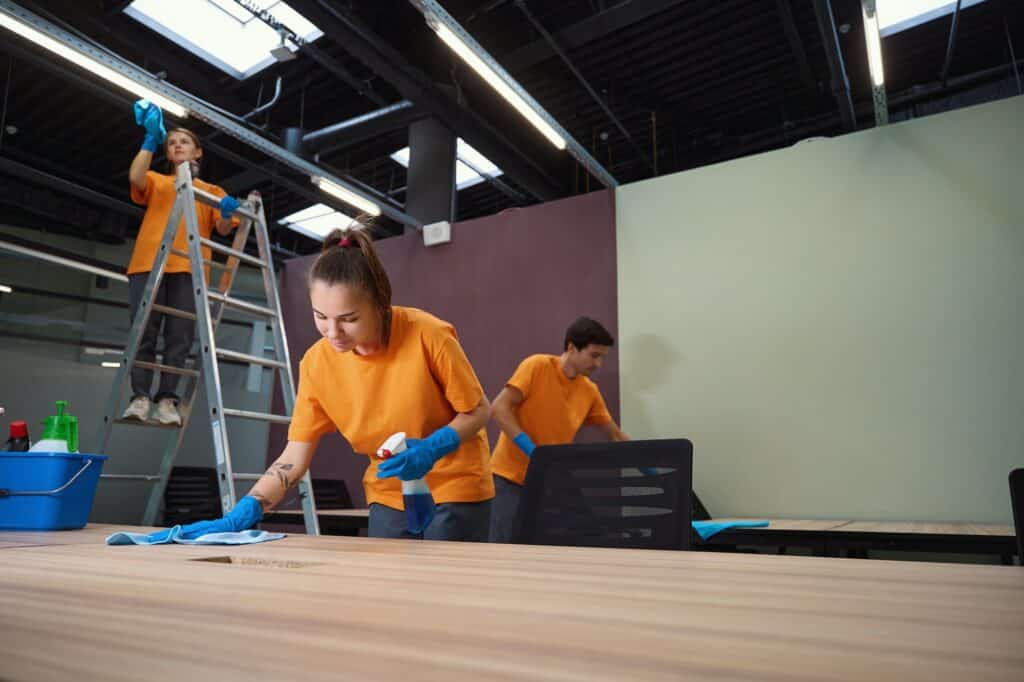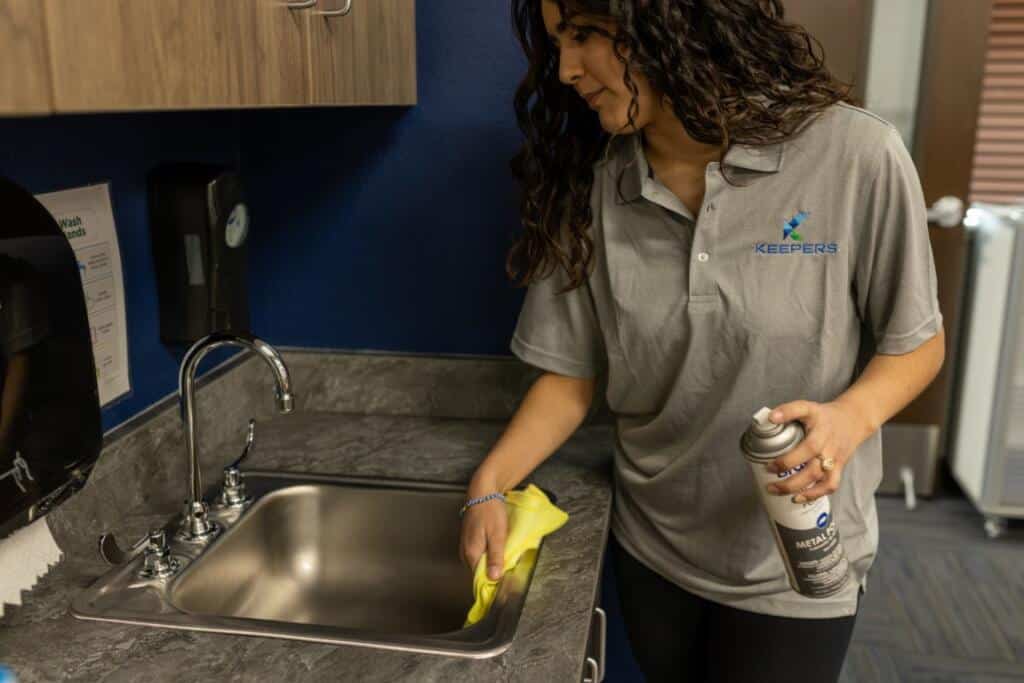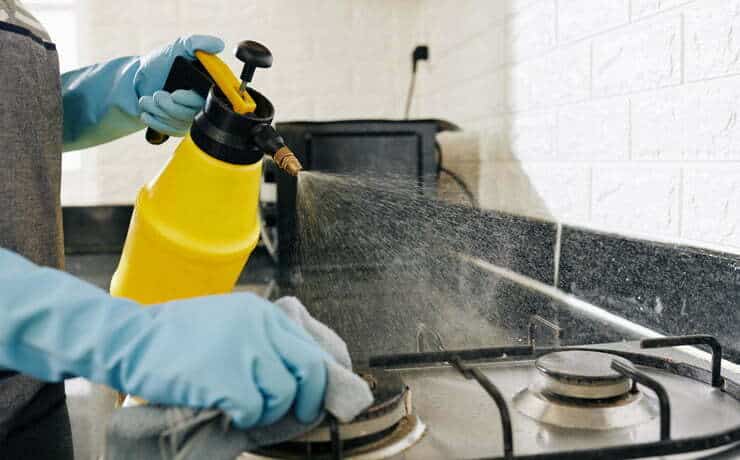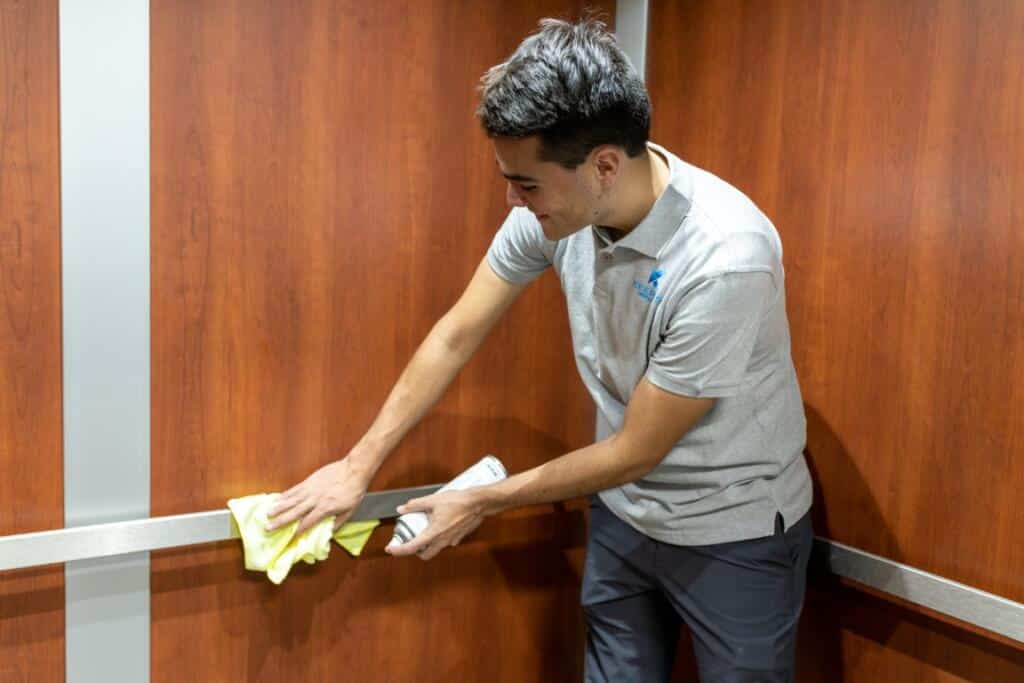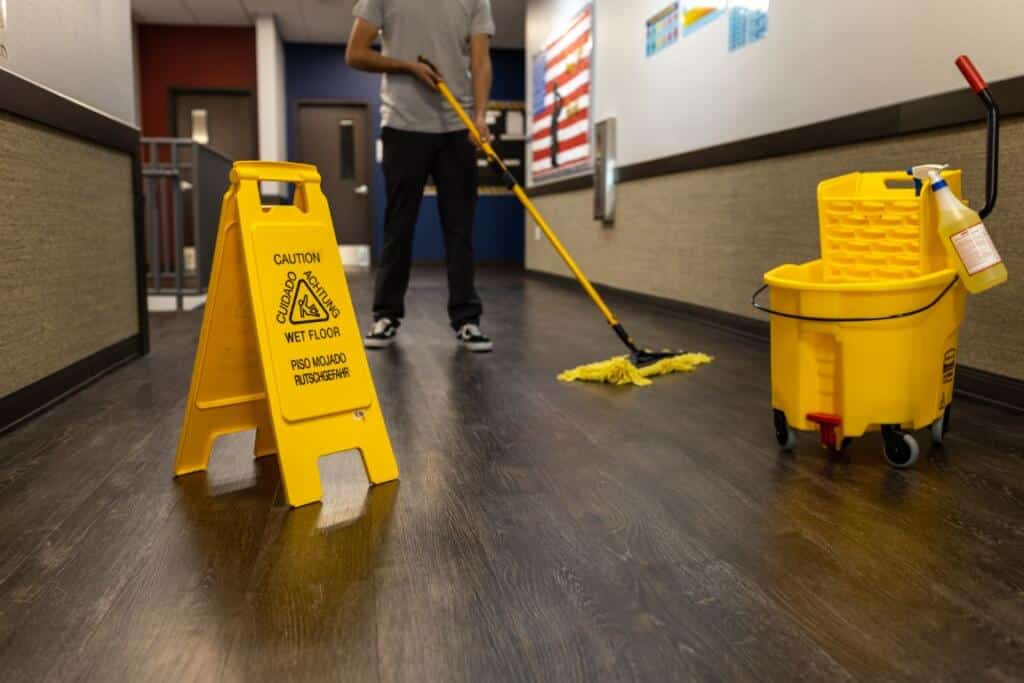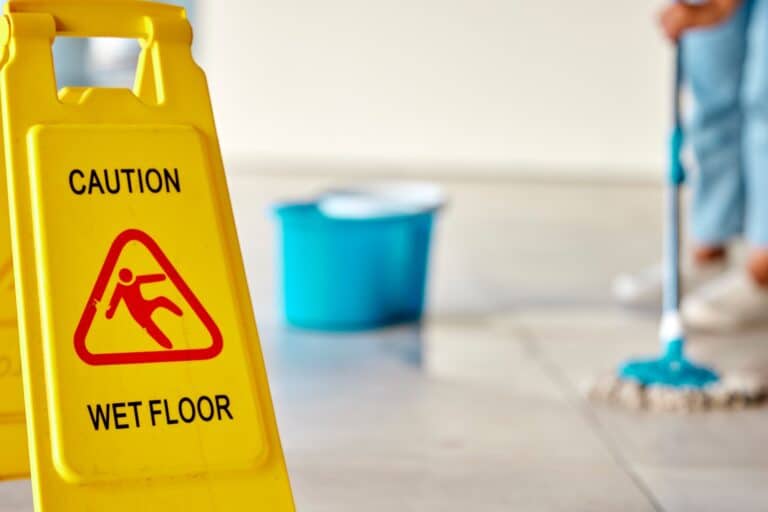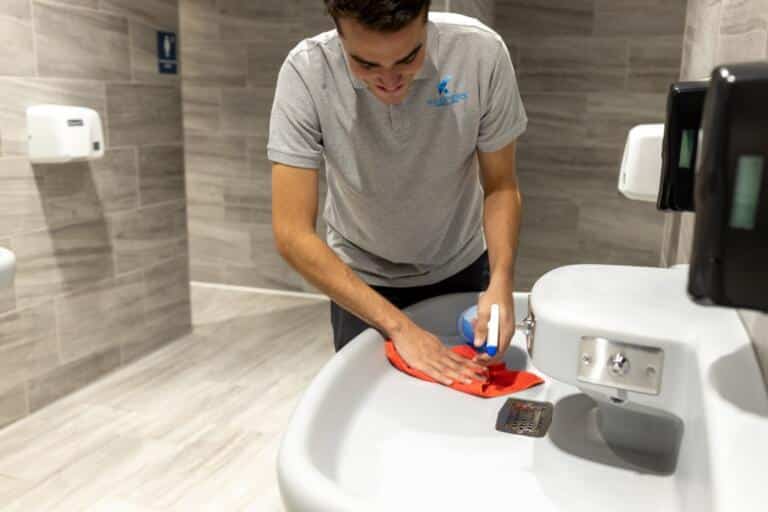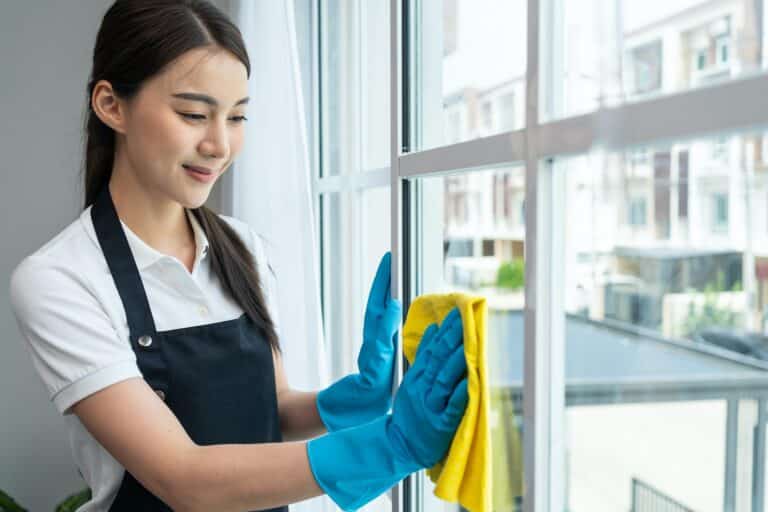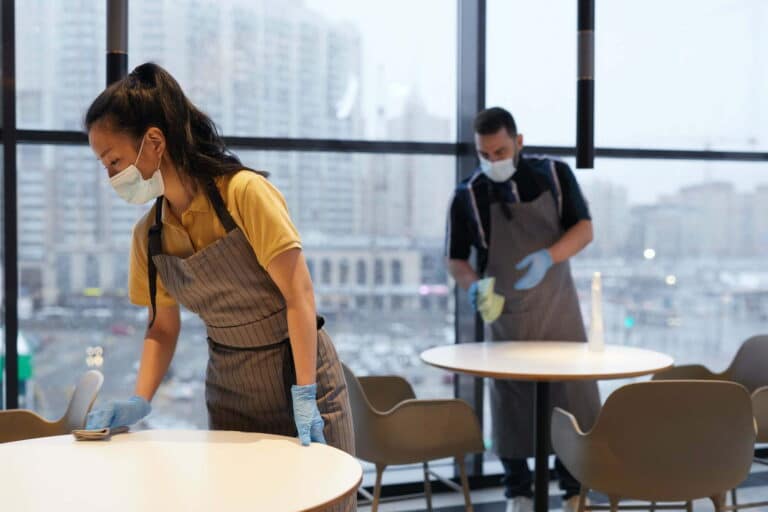Ever spilled something on your floor and reached for the nearest cleaning solutions, like chemicals in a spray bottle or a disinfectant? Next time, consider grabbing baking soda and a disinfectant instead. These cleaning solutions are handy tips for your next clean-up. This common kitchen mop is not just for salads anymore; it’s a natural cleaning solution with a punch for your hardwood floors and carpet! It works wonders on these materials. The acidity in vinegar gives it the power to cut through dirt and grime on your tile flooring, leaving it sparkling clean when you use a mop. Plus, using a vinegar solution to clean floors, especially hardwood floors, doubles as a disinfectant, killing off bacteria that can make us sick. And if you’re conscious about the environment, the use of vinegar for cleaning is an eco-friendly choice that reduces reliance on harsh chemicals.
Choosing the Right Vinegar for Cleaning Floors
Vinegar is a versatile cleaning agent that you can use, but not all types are suitable for use in cleaning floors. It’s crucial to pick the right kind for clean floors, and white distilled vinegar comes out on top.
The Case for Distilled White Vinegar
Distilled white vinegar is your best bet. Why? Two reasons: acidity and purity.
-
Acidity: Distilled white vinegar has a high acidity level that makes it an effective cleaner. It can cut through grime and dirt on clean floors like a hot knife through butter.
-
Purity in clean floors: Unlike other types of vinegar, distilled white vinegar used for clean floors doesn’t contain any additional flavors or colors. This means it won’t leave behind any residues or stains on your floors.
Now, you might be wondering about hardwood floors. Can you use distilled white vinegar on them? Absolutely! Just make sure to dilute it with water first (a good mix is half cup of vinegar to a gallon of warm water) for clean floors. This will lower the concentration, ensuring that the acidity doesn’t damage your beautiful hardwood.
Apple Cider Vinegar – Not Ideal for Floor Cleaning
On the other hand, apple cider vinegar isn’t ideal for floor cleaning. Sure, it smells better than white vinegar, but its brown color could potentially stain light-colored surfaces such as stone or tiles. Plus, it’s more expensive than its clear counterpart – so why spend more when you can achieve better results with less?
Availability and Cost-Effectiveness of White Vinegar
The beauty of using distilled white vinegar as a floor cleaner lies not just in its effectiveness but also in its availability and cost-effectiveness.
You can find this type of vinegar in almost any grocery store at a fraction of the price of commercial floor cleaners. Plus, since you’ll be diluting it with water before use (remember our mix?), one bottle goes a long way!
Correct Vinegar to Water Ratio for Floors
Cleaning with vinegar is a piece of cake, but the ratio matters. Let’s dive into the perfect mix and potential risks.
The Ideal Mix
One cup of vinegar to one gallon of water – that’s your golden ticket. This ratio is just right; like Goldilocks’ porridge in that fairy tale. It’s strong enough to fight off dirt and grime, yet gentle not to damage your floor.
-
Vinegar: Its acidity works wonders in breaking down gunk.
-
Water: Dilutes the vinegar so it doesn’t harm your floors.
Remember, we’re talking about white distilled vinegar here. Don’t go reaching for balsamic or apple cider vinegar!
Overdoing the Vinegar
Now you might be thinking, “More vinegar equals cleaner floors, right?” Wrong! Too much of anything isn’t good – even.
Over-concentration of vinegar can:
-
Damage your floor finish
-
Dull its shine over time
-
Even corrode some materials
So stick with our 1:1 ratio – no need to play chemist at home!
Varying Ratios Impact on Cleanliness
You see, changing up the ratio will affect how clean your floors get.
Too little vinegar? You’ll probably be left with streaks and spots because there won’t be enough acid to cut through the muck.
Too much? Besides risking damage, you might end up with a super shiny floor…but only temporarily! Over time, as we mentioned before, too much acidity can dull your floor’s finish.
To sum up:
-
More vinegar = temporary shine + potential damage
-
Less vinegar = less effective cleaning
Like I said earlier – balance is key!
Effectiveness of Vinegar on Different Floor Types
Alright, folks! Let’s get down to the nitty-gritty. Does vinegar really clean floors? And if so, which types?
Hardwood Floors and Vinegar
Hardwood floors can be a real pain to clean. But guess what? Vinegar comes to the rescue here because of its mild nature.
-
It doesn’t damage your precious hardwood.
-
It’s gentle but effective at getting rid of dirt and grime.
Just remember not to overdo it with the vinegar-water ratio (we talked about this in the previous section).
Ceramic Tiles Linoleum Floors Love Vinegar
Ceramic flooring is another type where vinegar shines. Same goes for linoleum floors too!
-
The acidic properties of vinegar work wonders on ceramic tiles.
-
For linoleum, it helps maintain that glossy finish we all love.
So next time you’re scrubbing away at those tiles or linoleum, give vinegar a shot!
Marble Stone Waxed Wood Not So Much
Now let’s talk about what doesn’t work. Marble, stone, and waxed wood surfaces are a big no-no.
-
The acid in vinegar can actually harm these surfaces.
-
It can strip wax off wood and etch marble and stone.
So keep that bottle of vinegar far away from these types of floors!
Surfaces Inappropriate for Vinegar Cleaning
Vinegar is a popular household cleaner, but it’s not suitable for all surfaces. Some materials could be damaged by vinegar’s acidic properties.
Natural Stone Surfaces Risk Damage
Natural stone surfaces like marble or granite are beautiful and durable. But they’re not the best pals with vinegar. The acidity in vinegar can etch these surfaces, leaving them dull and damaged.
-
For instance, imagine spilling some orange juice on your fancy marble countertop. You’d wipe it up pronto, right? That’s because you know the acid in the juice can harm the stone. Well, vinegar acts similarly.
-
So instead of using vinegar on these natural stone surfaces, go for a mild dish soap mixed with warm water.
Waxed Wood and Vinegar Don’t Mix
Got waxed wood floors? Keep that vinegar away! The acidic properties of vinegar can strip off the finish on your lovely waxed wood floors.
-
Think about it like this: you wouldn’t use sandpaper on a glossy photo, would you? Same thing here. Using vinegar on waxed wood is akin to rubbing sandpaper over that glossy picture.
-
Instead of vinegar, just use a damp cloth to clean these floors. Remember not to soak them – too much moisture is another no-no for wood!
Certain Types of Grout Suffer Harmful Effects
Grout does an important job holding tiles together and keeping moisture out from under them. But certain types of grout don’t take kindly to being cleaned with vinegar.
-
It might seem like a good idea at first – after all, who doesn’t want their grout looking bright and clean?
-
However, due to its porous nature and often light coloration, grout can easily absorb colored substances leading to discoloration.
-
Over time though, the acidity in vinegar can break down grout, leading to potential damage. For these areas, a safer alternative would be a paste of baking soda and water.
So while vinegar can be a great go-to for many cleaning tasks around the house, it’s not always the best choice. Remember to consider the surface material before you start scrubbing away with your vinegar solution.
Precautions When Using Vinegar Around Children
Practical Methods for Cleaning Floors with Vinegar
Cleaning floors with vinegar can be a game-changer. Let’s dive into some practical ways to do it.
Soak Mop or Cloth in Solution
First things first, you gotta get your mop or cloth soaked in the cleaning solution. Here’s how you make it:
-
Mix equal parts of vinegar and water in a bucket.
-
Add a few drops of dish soap to give it an extra kick.
-
Dunk your mop or cloth into this mixture.
Don’t forget to wring out the excess liquid before mopping away! This way, you avoid leaving too much water on your floor, which could lead to damage.
Rinse After Application
Now here’s the thing about vinegar – it can leave behind some residue if not rinsed properly. So once you’ve given your floor a good scrubbing, take another clean mop or cloth and rinse the area with plain water.
This simple step ensures that no sticky residue is left behind on your flooring, keeping it shiny and squeaky clean.
Quick Drying Techniques
After rinsing comes drying. You don’t want any water sitting around on your floors for too long because that could lead to damage like warping or discoloration.
Here are some quick drying methods:
-
Use fans: Set up a fan facing towards the wet area to speed up evaporation.
-
Open windows: If weather permits, open up some windows to let fresh air circulate and aid in drying.
Remember, these steps are especially important if you’re dealing with wood floors as they’re more susceptible to water damage!
Final Verdict on Vinegar as a Cleaner
So, there you have it folks! Vinegar isn’t just for your fish and chips; it can be a real game changer in your cleaning routine. But remember, not all heroes wear capes – some come in bottles labeled ‘vinegar’. However, it’s not a one-size-fits-all solution. Some surfaces love the tangy touch of vinegar, while others might throw a fit. And don’t forget about keeping the kiddos safe when you’re on your vinegar-cleaning spree.
Ready to give vinegar a spin on your floors? Go ahead! Just make sure to follow our practical methods and precautions. Your floors could end up looking spick-and-span without breaking the bank or harming Mother Earth. So why not try swapping out those chemical-laden cleaners for something more natural?
FAQs
Can I use apple cider vinegar instead of white vinegar for cleaning?
While apple cider vinegar can also clean, white vinegar is usually recommended due to its higher acidity level and less staining potential.
Is it safe to clean with vinegar around pets?
Yes, it is generally safe as long as it is properly diluted and used in well-ventilated areas. However, always monitor your pets during cleaning.
How often should I clean my floors with vinegar?
This depends on foot traffic and personal preference but once a week should suffice for most homes.
Can I use scented vinegars for cleaning?
Sure thing! Scented vinegars can add a pleasant aroma while doing the tough job of cleaning.
Does using vinegar leave an odor after cleaning?
Vinegar does have a distinct smell that dissipates after drying. If you’re sensitive to its smell, consider adding essential oils.

